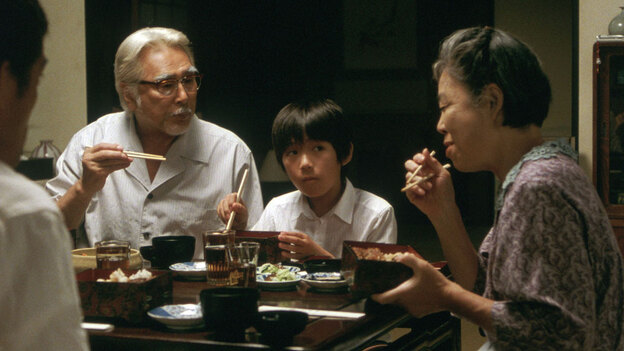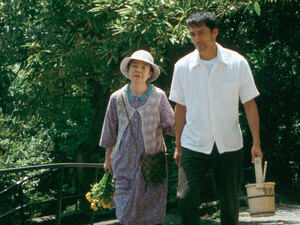'Still Walking' Along Family Fault Lines

Unhappy in their own way: Three generations of a Yokoyama family convene for a rocky reunion in Hirokazu Koreeda's Still Walking. From left, patriarch Kyohei (Yoshio Harada), his step-grandson Atsushi (Shohei Tanaka) and matriarch Toshiko (Kirin Kiki).
Still Walking
- Director: Hirokazu Koreeda
- Genre: Art, Foreign, Drama, Family
- Running Time: 114 minutes
- Japanese, with English subtitles
Not Rated
With: Hiroshi Abe, Kirin Kiki, Yoshio Harada, Yui Natsukawa and Susumu Terajima
(Recommended)
Set in an oceanfront Yokohama suburb, the poignant Still Walking uses cultural specifics to conjure universal emotions. Japanese families assemble for different occasions than Western ones, but what happens once the various factions gather under the same roof is not so dissimilar.
In this delicate comedy-drama, three generations convene to mark the anniversary of a favored son's death. That premise won't startle fans of writer-director Hirokazu Koreeda: All but one of the filmmaker's six features, which include the charming Afterlife and the heartbreaking Nobody Knows, are about death, ritual and acceptance.
Fifteen years ago, Shunpei died while saving a boy from drowning, a shock his parents have yet to overcome. An unhappily retired doctor, Kyohei (Yoshio Harada) still maintains the premises of the clinic he expected his son to run. His wife's frustration is less focused, but Toshiko (Kirin Kiki) can't entirely suppress her rage.
The couple has two other children, Ryota (Hiroshi Abe, who's principally an action star) and Chinami (You, who played Nobody Knows's runaway mother); Kyohei and Toshiko aren't all that impressed with Chinami's husband, a car salesman who doesn't sweat his in-laws' disapproval, or with the couple's two children.
But Ryota is the chief disappointment, and not just because he became an art restorer rather than a doctor. He also recently married a widow, Yukari (Yui Natsukawa), with a young son, Atsushi (Shohei Tanaka). Like many older Japanese, Toshiko regards second marriages and stepchildren with suspicion. Kyohei is brusque with Yukari but sees Atsushi as a fresh opportunity; he quickly begins selling the boy on a medical career.
The movie takes its title from Toshiko's favorite song, "Blue Light Yokohama," a Latin-tinged 1970s Japanese hit whose protagonists "walk forever and forever." Koreeda also sends his characters on a few walks, including one to Shunpei's grave.
Yet most of the action occurs, during a single day, within the grandparents' house. The reunion is interrupted by only a few outsiders, notably the boy Shunpei saved. The rescued child has grown up to be fat and unemployed, which enrages Kyohei. For Shunpei's parents, requiring the man to commemorate their son's death at their home's Buddhist altar has become a form of revenge.

Ryota (Hiroshi Abe) is the family disappointment; he's an art restorer, not a doctor like his father, and he's married to a widow. His mother tells him to think about having children: "It's harder to divorce with children," she advises.

Ryota (Hiroshi Abe) is the family disappointment; he's an art restorer, not a doctor like his father, and he's married to a widow. His mother tells him to think about having children: "It's harder to divorce with children," she advises.
Still Walking isn't an American-style family melodrama, which typically builds to screaming rage or shocking revelation. The movie's style is gentler and more affectionate than that, sometimes recalling the work of Yasujiro Ozu, Japan's mid-20th-century master of the "home drama." (There are also touches that don't recall Ozu, including naturalistic camera framing and a Joy Division poster on a bedroom wall.)
The film's warmth can be traced to its origins in Koreeda's memories. The director began his career in documentary, and has derived most of his previous scripts from the actual experiences of interviewees. This is the first time he's drawn on his own life, particularly for the character of Toshiko, but also for such evocative homespun details as the making of corn tempura.
A shade more sentimental than Koreeda's other movies, Still Walking concludes with an epilogue that reveals how much Ryota was affected by his parents — even if not in the ways they planned. Quite aside from Shinto transformation parables or Buddhist reincarnation teachings, the final scene shows how family wisdom is conserved and recycled. It's a moment that might elicit a smile or a tear, or perhaps both. (Recommended)
More Movie Reviews

Movie Reviews
An Inspiring Teacher, Exactly When He's Needed
A drama populated with complicated characters focuses on a Montreal middle school. (Recommended)

Movie Reviews
'Hit So Hard': At The Center, But Still Out Of Focus
A new documentary profiles Patty Schemel, the drummer for the '90s alternative rock band Hole.

Movie Reviews
'Cabin In The Woods': A Dead-Serious Genre Exorcism
A rule-breaking horror thriller penned by Joss Whedon smartly critiques the genre. (Recommended)
Comments
Please keep your community civil. All comments must follow the NPR.org Community rules and terms of use. See also the Community FAQ.
NPR reserves the right to read on the air and/or publish on its website or in any medium now known or unknown the e-mails and letters that we receive. We may edit them for clarity or brevity and identify authors by name and location. For additional information, please consult our Terms of Use.









Community features and content, including commenting and recommending stories, are unavailable at this time. We apologize for the inconvenience. Please try this page later. Using Internet Explorer? Read our special advisory.